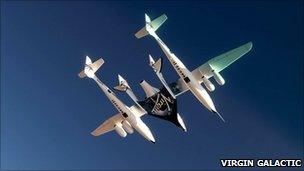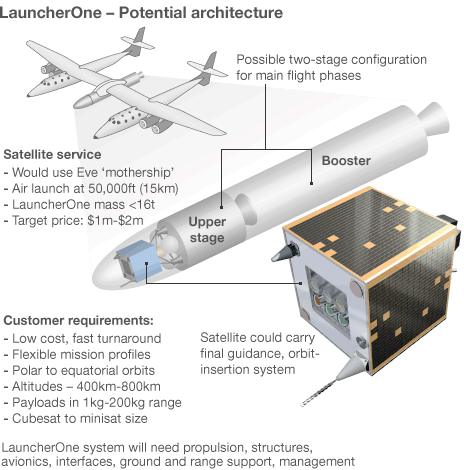Virgin Galactic slows satellite launcher plans
- Published

The Virgin Galactic "mothership" and spaceliner are currently going through a series of trials
Virgin Galactic's satellite launching rocket LauncherOne that once attracted $110m in investment is now in doubt.
LauncherOne's manager has departed and the space tourism company's chief executive is talking only about future possibilities for the rocket.
The rocket would take satellites weighing up to 200kg (440lbs) into low-Earth orbit for $1-2m.
LauncherOne was to be air-launched from Virgin Galactic's WhiteKnightTwo aircraft.
This is the same plane that will also launch Sir Richard Branson's tourist carrying SpaceShipTwo spacecraft.
In July 2009, Abu Dhabi-based Aabar Investment offered Virgin Galactic $110m for LauncherOne development, if further studies proved the business case.

Later that year, Sir Richard's Galactic team took on Adam Baker to be its general manager for small satellite launch and to conduct those studies.
Dr Baker had previously worked for Surrey Satellite Technology Limited, the British small spacecraft manufacturer.
The Guildford-based company had been looking to find cheaper and more timely access to space for its clients and had spoken to Virgin Galactic about working on the LauncherOne project in 2008 and early 2009.
But SSTL backed out after attempts to raise some feasibility funding from the then British National Space Centre (now the UK Space Agency) did not succeed.
Soon after Dr Baker's employment started at Galactic, the company's President Will Whitehorn told an October 2009 conference that LauncherOne could start operating a year after the sub-orbital tourism business was up and running.
However, Dr Baker left Virgin Galactic last month and there is no clear explanation from the company as to why the project is not set to follow Mr Whitehorn's timetable.
"It's potentially an exciting area. Galactic as a whole may at some point in the future continue to work beyond looking at future projects," Virgin Galactic's CEO George Whitesides told the BBC. "It's an area we continue to think about."
He rejected the suggestion that the US government's technology export laws had in anyway contributed to the project's lack of progress.
In the meantime, the company continues to test its carrier aircraft ("Eve") and its spacecraft.
Sir Richard told a business conference in Kuala Lumpur last week that Galactic was on track to offer its short hops above the atmosphere for paying passengers within 18 months.
The fares to board the spacecraft SpaceShipTwo ("Enterprise") start at $200,000. The company has already taken deposits from more than 300 hopeful passengers.